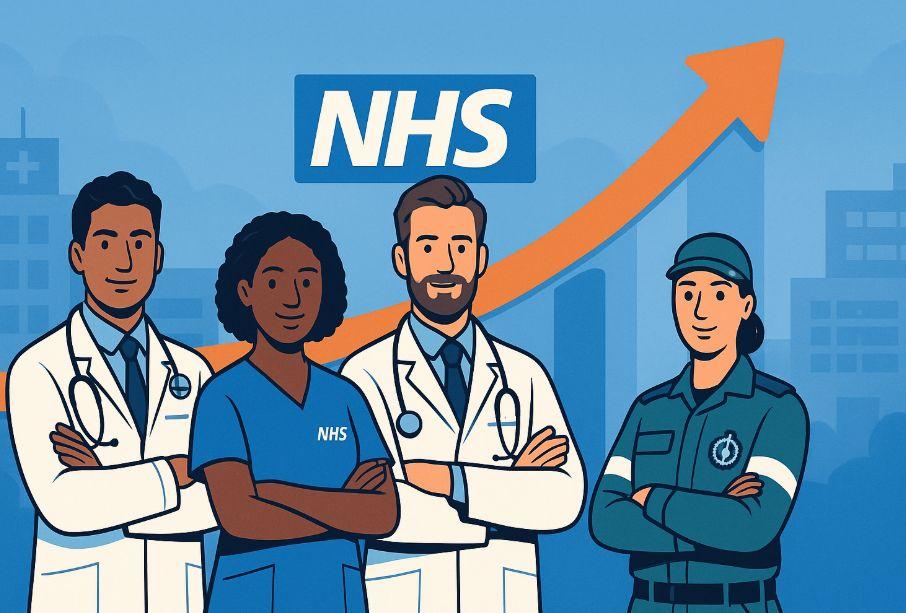The National Health Service (NHS) remains one of the United Kingdom’s most valued institutions, with millions relying on its services daily. Yet, the foundation of this system. its workers has long been engaged in debates over fair compensation. As we approach 2025, discussions surrounding the NHS wage rise have reached new urgency.
With inflation high and job pressures mounting, the forthcoming pay adjustments are not just routine updates but a critical step in shaping the future of healthcare delivery in the UK. This blog explores the anticipated salary changes for NHS workers, what is driving these adjustments, and what broader impacts can be expected.
How Much Will NHS Staff Salaries Increase in 2025?

Understanding the Projected Pay Rise
The 2025 NHS wage rise is projected to deliver an average salary increase between 5% and 6%. This adjustment is an attempt to keep pace with the rising cost of living and to ensure the NHS remains an attractive employer in an increasingly competitive labour market.
Factors Determining Salary Adjustments
The precise increase any individual will receive varies based on job role, length of service, and geographic location. London-based healthcare workers, for example, often benefit from the High Cost Area Supplement, leading to higher overall pay increases than counterparts in other regions.
Timeline for Implementation
The new pay scales are expected to come into effect from April 2025, aligning with the start of the financial year. This ensures minimal disruption and clarity for both staff and NHS employers during the transition.
Which NHS Jobs Will See the Biggest Pay Boost?
Spotlight on High-Demand Specialties
Certain NHS roles, particularly in areas suffering acute staff shortages, are anticipated to receive larger-than-average pay increases. Emergency medicine, mental health services, and operating theatre staff are key focus areas.
Junior Doctors and Nurses
Junior doctors, who have historically campaigned for better pay, stand to benefit significantly. Nurses, too, particularly those in mental health and community care roles, are slated for considerable wage improvements.
The Importance of Strategic Pay Increases
By strategically targeting wage boosts in these areas, the NHS aims not only to retain existing staff but also to attract new recruits into high-pressure specialties that are vital to patient care.
How Will the 2025 NHS Wage Rise Affect Different Pay Bands?
Breakdown of Pay Bands
The NHS uses a structured pay banding system under the Agenda for Change framework. Each band reflects levels of responsibility, skills, and experience.
Detailed Pay Band Adjustments for 2025
| Band | Current Average Salary (2024) | Projected Salary (2025) | Estimated % Increase |
| Band 2 | £22,383 | £23,502 | 5% |
| Band 3 | £23,754 | £24,941 | 5% |
| Band 5 | £28,407 | £29,827 | 5% |
| Band 6 | £35,392 | £37,161 | 5% |
| Band 7 | £43,742 | £45,929 | 5% |
| Band 8a | £50,952 | £53,500 | 5% |
Addressing Pay Disparities
One of the goals of the 2025 adjustment is to address existing disparities, ensuring that salary progressions within and across bands reflect the evolving demands on healthcare workers.
What Are the Main Reasons Behind the NHS Wage Increase?

Responding to Workforce Challenges
The NHS is grappling with significant workforce shortages. Increasing wages is seen as a primary lever to retain existing staff and attract new talent into the service.
The Rising Cost of Living
With inflation rates elevated post-pandemic, real wages for NHS staff have suffered. The planned wage rise aims to offset at least some of the impact on workers’ living standards.
Public and Political Advocacy
Persistent advocacy from professional bodies and public support has pressured policymakers to invest more heavily in NHS salaries, recognising the pivotal role healthcare workers play in national wellbeing.
Is the NHS Wage Rise Keeping Up With Inflation?
Inflation Projections for 2025
The Bank of England forecasts that inflation will remain around 6% in 2025. While the wage rise matches or slightly trails this figure, it marks a shift towards keeping NHS pay more aligned with living costs.
Real-Term Wage Changes
Despite the nominal increases, real-term wage improvements for NHS staff remain modest. However, for many, this pay rise will help stem the erosion of earnings experienced over the past decade.
Future Inflation-Linked Adjustments
There is growing discussion about linking NHS pay reviews more directly to inflation rates in the future, ensuring that salary growth maintains parity with economic conditions.
How Will the 2025 Pay Rise Impact NHS Recruitment and Retention?
Challenges in Attracting New Talent
The NHS has faced ongoing difficulties in recruiting nurses, doctors, and allied health professionals. Enhanced wages form part of a broader strategy to boost the appeal of NHS careers.
Retaining Experienced Staff
Retention is equally critical. Many experienced healthcare professionals have considered early retirement or moving abroad. Competitive salaries can act as an incentive to stay within the NHS system.
Broader Workforce Strategies
Alongside pay rises, the NHS is investing in staff wellbeing programs, flexible working arrangements, and professional development opportunities to support workforce stability.
What Changes Are Expected in the Agenda for Change Pay Structure?

Revisions to Pay Progression
Planned reforms include adding new incremental points within pay bands, allowing for more gradual and rewarding career progression.
Regional Pay Adjustments
There is a proposal to revise regional pay differentials more comprehensively. In high cost living areas like London and the Southeast, the High-Cost Area Supplement may be increased to reflect real expenses.
Simplifying Pay Structures
Efforts are also being made to streamline the complex pay banding system, making it more transparent and easier for employees to understand their career and earnings trajectory.
How Is the NHS Pay Review Body Shaping the 2025 Wage Rise?
Independent Recommendations
The NHS Pay Review Body (PRB) gathers evidence from unions, employer organisations, and the government to make independent recommendations on pay.
Key Considerations
For 2025, the PRB has emphasised the importance of competitive pay, especially for entry-level and hard-to-fill positions, alongside maintaining fiscal responsibility.
Implementation of PRB Advice
The government has indicated that it will accept the PRB’s recommendations, subject to budgetary constraints, ensuring that the process remains grounded in evidence and fairness.
Will NHS Nurses and Doctors Benefit Equally From the Pay Rise?
Comparative Pay Increases
Junior doctors are expected to see slightly higher percentage pay rises compared to nurses, mainly to address prior grievances related to pay erosion.
Recognition of Nursing Contributions
Nurses, particularly in high-need areas like mental health and intensive care, will also enjoy notable pay increases, reflecting their critical role in the NHS workforce.
Variations Across Specialties
Specialties facing greater recruitment challenges will likely see tailored pay rises, ensuring that wage growth targets sectors where staff shortages are most acute.
What Can NHS Staff Expect in Their Payslips in 2025?

Gross Salary Improvements
Staff across the NHS can anticipate a meaningful rise in gross monthly earnings, improving household financial stability for many.
Impact on Pension Contributions
As salaries increase, corresponding pension contributions under the NHS Pension Scheme will also rise slightly, but the long-term benefits are expected to outweigh short-term costs.
Net Pay Outcomes
While gross salaries are increasing, individual net pay will vary depending on tax brackets and personal pension contribution levels. However, most staff will notice a tangible improvement in take-home earnings.
How Does the NHS Pay Rise Compare With Other Public Sector Pay Increases?
Benchmarking Across the Public Sector
Teachers, police officers, and civil servants are projected to receive wage increases of between 3.5% and 4.5% in 2025, making the NHS pay rise relatively generous in comparison.
Ensuring NHS Pay Competitiveness
By leading the public sector in wage increases, the NHS hopes to attract a larger share of skilled professionals and enhance its reputation as a competitive employer.
What Are Experts Predicting for NHS Salaries Beyond 2025?

Projections for Future Increases
Analysts predict that annual incremental increases will continue, albeit dependent on broader economic conditions and government funding priorities.
Impact of Economic Trends
Long-term salary growth will likely be influenced by inflation trends, public finance health, and changing workforce needs within the NHS.
Towards a Sustainable Pay Model
There is increasing advocacy for multi-year pay settlements, which would provide stability for both employees and budget planners, helping to avoid the year-on-year uncertainty that currently characterises NHS pay discussions.
Conclusion
The NHS wage rise planned for 2025 represents an important step in acknowledging the hard work and dedication of healthcare staff. While it may not fully shield workers from the challenges of inflation, it moves the dial in the right direction, offering greater financial stability and incentives to stay within the NHS.
In the broader context of workforce planning and service delivery, fair pay remains central to maintaining a resilient and effective healthcare system for the future.
FAQs About NHS Wage Rise in 2025
What is the current starting salary for NHS nurses?
As of 2024, Band 5 nurses start at around £28,407, with this set to rise to approximately £29,827 in 2025.
How frequently are NHS wages reviewed and adjusted?
Wages are typically reviewed annually by the NHS Pay Review Body, with updates implemented at the start of the financial year.
Are junior doctors getting a separate 2025 pay increase?
Yes, junior doctors are receiving tailored increases averaging 6%, reflecting efforts to address historical pay imbalances.
What is the NHS pay banding system?
The Agenda for Change framework classifies NHS jobs into pay bands based on responsibilities and qualifications, ensuring equity across roles.
How will the 2025 pay rise affect NHS pension contributions?
As gross salaries rise, pension contributions also increase slightly, though enhanced pensions later balance this out.
Will London NHS workers get additional pay benefits?
London NHS staff will continue to receive a High-Cost Area Supplement, which is also slated for a proportional increase.
How does NHS pay compare with private sector healthcare salaries in 2025?
While private sector wages can be higher, NHS roles offer attractive benefits, including pensions, annual leave, and job security.









Leave feedback about this